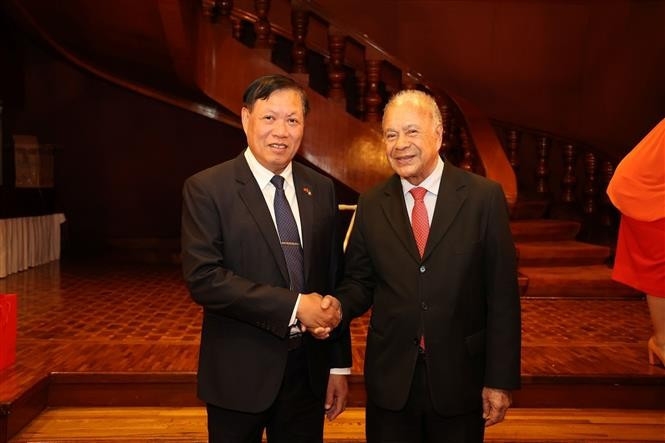During a working visit to Mexico from November 23-27, a delegation led by Deputy Minister of Health Do Xuan Tuyen held a bilateral meeting with Mexican Minister of Health David Kershenobich Stalnikowitz to advance comprehensive health cooperation between the two countries.
    |
 |
|
Deputy Minister Do Xuan Tuyen (left) and Alberto Anaya Gutiérrez, General Secretary of the Mexican Workers' Party |
The meeting took place as the two nations mark the 50th anniversary of their diplomatic relations (1975–2025), a significant milestone opening a new chapter in bilateral health cooperation.
At the talks, both sides reviewed the 20-year journey since the signing of the 2004 Agreement on Health Cooperation. Despite the geographical distance, medical cooperation between Vietnam and Mexico has been maintained steadily, achieving notable results, among them cooperation in traditional medicine, especially acupuncture, which has become a vivid symbol of the friendship between the two nations’ people.
This is reflected through the effective operation of two Ho Chi Minh Acupuncture Centers in Mexico City and Monterrey, established through collaboration between Vietnam’s National Hospital of Acupuncture and the Mexican Labor Party.
Speaking at the meeting, the Mexican minister praised the positive outcomes achieved between the two ministries and noted that Vietnam–Mexico health cooperation holds substantial potential, particularly in traditional medicine and acupuncture, health care workforce training and pharmaceutical development.
He emphasized that Mexico attaches importance to integrating traditional medicine with modern medicine in health care, considering this a strategic component of the national health system.
Tuyen outlined Vietnam’s major upcoming healthcare reforms, such as a strong shift from treatment to prevention, the rollout of nationwide annual health check-ups from two thousand twenty-six, the promotion of digital transformation and electronic health records, the development of traditional medicine on par with modern medicine and the enhancement of international cooperation to strengthen the health system.
On this basis, the Deputy Minister proposed several areas for expanded collaboration in the coming period, including acupuncture and traditional medicine, the development of medicinal herbs and herbal-based drugs, expert exchanges and doctor training, scientific research, pharmaceutical trade promotion and medical tourism development.
The two ministries officially signed a new Memorandum of Understanding (MoU) on health cooperation, replacing the 2004 Agreement, that both sides will strengthen co-operation in potential areas, including traditional medicine such as acupuncture, medicinal herb development and herbal medicines; expert exchanges, doctor training and scientific research; pharmaceutical trade promotion and medical tourism development.
This new framework is expected to drive bilateral cooperation in a more dynamic, practical and context-appropriate manner, particularly in the post-pandemic era and in line with each country’s health reform strategies.
The visit marks not only a reinforcement of traditional health cooperation but also the start of a new phase of deeper, more effective and sustainable collaboration, matching the potential and development needs of the two countries across two continents.
Source: VNA